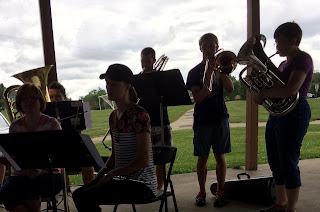I love band. I have since I was 12 years old and made my very first sound on a Euphonium.
It is my first love, it is what got me through high school and it is what I studied at college.
I have spent many, many hours in rehearsals. I have had many different conductors.
As a freshman in college I played under a conductor who was also brand new to the school. He was young, friendly, and an amazing musician, but his rehearsals were unbearably tedious.
Often we would be working on a new piece of music when he would notice that the flutes or clarinets (it was always the flutes or clarinets) were struggling with a difficult section where they had to play a lot of notes in a very short amount of time. He would stop and ask them to play the section alone. It would become obvious that it needed some work, so he would take some time to work on it, sometimes as much as 20 or even 30 minutes.
Trombone players are not good at sitting and waiting.
(They are a little bit like 2-year olds, only sneakier.)
Trumpet players are also not very good at sitting and waiting.
(They really like to be important.)
Tuba players get comfortable and are soon snoring softly (or loudly).
This conductor also had a tendency to stop whenever anything wasn't perfect, and well, we weren't very perfect. This meant that we often found ourselves on stage preparing to play a song through from beginning to end for the very first time in front of an audience.
Usually, it was fine.
We were college musicians, after all.
Sometimes it was not fine.
We were, after all, just college musicians.*
In contrast, I currently find myself playing with the West Michigan New Horizons Music Ensembles Symphonic Band under the direction of Dr. Nancy Summers.
I have been playing with the New Horizons Band for about five years now
and I enjoy the rehearsals very much.
Sometimes when we are learning a new piece of music Nancy will notice that the flutes or clarinets are struggling with a difficult section where they have to play a lot of notes in a very short amount to time. She will stop and ask them to play the section alone. It will become obvious that it needs some work so she will ask them to work on it at home over the coming week. She may give them some pointers about how to practice it effectively and then we move on. At the next rehearsal we will cover that spot again, perhaps another minute or two of help and some encouragement to keep working on it and just as the trombone players are wondering if they can get away with something
we are all back in.
Nancy notices whenever something isn't perfect, and believe me, we are not perfect.
(She is often jotting down notes for future rehearsals.)
But we never find ourselves on stage preparing to play a song through for the first time. She makes sure that we spend some of our time in rehearsal running our pieces
from top to bottom, no matter what!
This can get very interesting, but far more often it is surprisingly empowering.
"Did you notice how we got it back together after that near train wreck?"
Sometimes our most moving musical experiences happen during rehearsal.
It's a shame to miss the glorious musical moments just because they happen in a rehearsal.
Not only is this helpful when performance time comes,
but it is amazing how satisfying it makes a rehearsal feel.
Music is funny that way. Try listening to the first half of a song and then go on with the rest of the day. It leaves a strangely unsettled feeling, like stopping mid-sentence, or wearing one shoe.
Now for the Comparison.
I know you are on pins and needles to know how life is like a band rehearsal.
Well, here it is: If we spend all our time focusing on one little issue that we find particularly difficult we will find ourselves unsatisfied and unhappy.
Everyone has something that is hard.
For flutes and clarinets it is those inevitable sixteenth-note runs.
For tubas it is not getting lost during those endless oom-pahs and then missing the interesting parts.
For me it is using my time effectively.
For you it may be something completely different.
I know that I need to work on my faults. This isn't permission to ignore them completely.
There are certainly times when a full on Stop and Fix is in order.
However, it is permission to live the whole day, clear through, stopping only briefly, here and there to look at the difficult spots and plan how to work on them, then moving on.
Don't quit every time something isn't perfect.
Push through. Make a plan.
Come back to it, but don't dwell on it.
Glorious moments happen all around us, all the time, while we are just living our lives.
The "rehearsal" days of our lives can be fun, creative and satisfying.
Don't put off living for the "performance" days.
Don't put off living for the "performance" days.




No comments:
Post a Comment